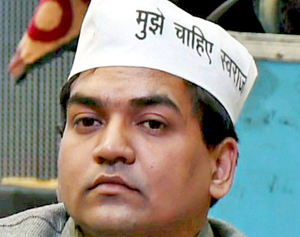New Delhi, May 7: Aam Aadmi Party (AAP) leader Kapil Mishra was on Friday sacked as Delhi's Water Minister by chief minister and party convener Arvind Kejriwal.

Mishra is expected to hold a press conference at 11 AM today, and share information about a "tanker scam" - a promise he made in a tweet last evening. He has also sought a meeting with Delhi Lieutenant Governor Anil Baijal.
Why was mishra sacked?
Kapil Mishra is among the handful of party leaders to have backed their AAP colleague Kumar Vishwas, who left the party red-faced when he indirectly attacked the Delhi government in a video in the run-up to the Municipal Corporation of Delhi (MCD) elections.
After the polls - in which AAP was crushed by a rampant Bharatiya Janata Party (BJP) - Vishwas said electronic voting machines weren't responsible for the defeat, contradicting the party's official position.
And when the now-suspended Amanatullah Khan accused Vishwas of being a "BJP-RSS agent" and of planning a coup against Kejriwal, Mishra sided with the latter during the infighting that ensued. The AAP chief is believed to have been unhappy with the lobbying of MLAs and ministers within the party.
The decision to fire Mishra was taken after AAP legislators alleged at a meeting with Kejriwal that a major water crisis during the MCD polls caused their candidates to lose.
While Delhi Deputy Chief Minister Manish Sisodia on Friday cited water management during the Delhi municipal elections as the reason for Kapil Mishra's dismissal, AAP's leadership appeared to send a clear message that it wouldn't tolerate any discipline.
'Massive tanker scam expose'
Just minutes before Sisodia announced Mishra's removal, the former water minister tweeted that he would do "a massive expose on (a) tanker scam" today, and that he would make public the "explosive details" he had shared with Arvind Kejriwal.
He has threatened to level charges against those "close to Kejriwal," and has sought an appointment with the Anti-Corruption Bureau chief to provide more evidence.
"I was about to reveal big names and perhaps, because of that such a decision has been taken against me", Mishra said on Friday, after his dismissal.
And yet, as of 8.40 on Sunday morning, Mishra - who said he hadn't been officially informed about his sacking - continued to say in his Twitter handle's description that he was a "proud member of (the) Cabinet of Arvind Kejriwal ji."







Comments
Add new comment